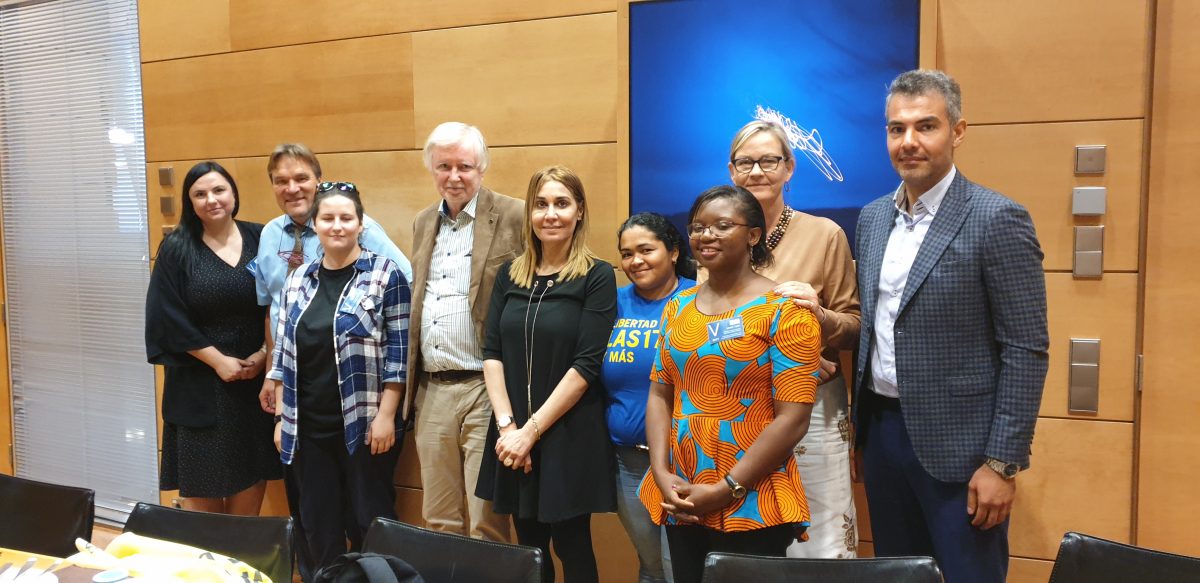
20 January, 2020
Women human rights defenders in Helsinki: “Stand by us”
Memory Bandera Rwampony, DefendDefenders’ program director, was invited by KIOS Foundation to give input on how the European Union could effectively support women human rights defenders
Brave women from around the world visited Helsinki at the end of August to share their experiences in being human rights defenders. They also offered their advice on how Finland and the EU could support human rights defenders more effectively.
Finland currently holds the presidency of the Council of the European Union, which gives it an unique opportunity to promote human rights defenders. That is why Amnesty Finland and KIOS held a seminar in 29th of August called Supporting women, protecting rights, in which human rights defender from around were heard.
The topic of the seminar was the risks human rights defenders face and how the EU could support them more effectively.
The next day four HRDs took their message straight to the EU foreign ministers, who gathered at Finlandia Hall. For the first time in EU’s history, members of the civil society were invited to Gymnich, an unofficial lunch meeting for foreign ministers. They shared their views with the ministers and answered questions.
During the week, HRDs invited to Finland had a chance also to meet EU ambassadors, Finnish members of the Parliament and officials of the Foreign Ministry.
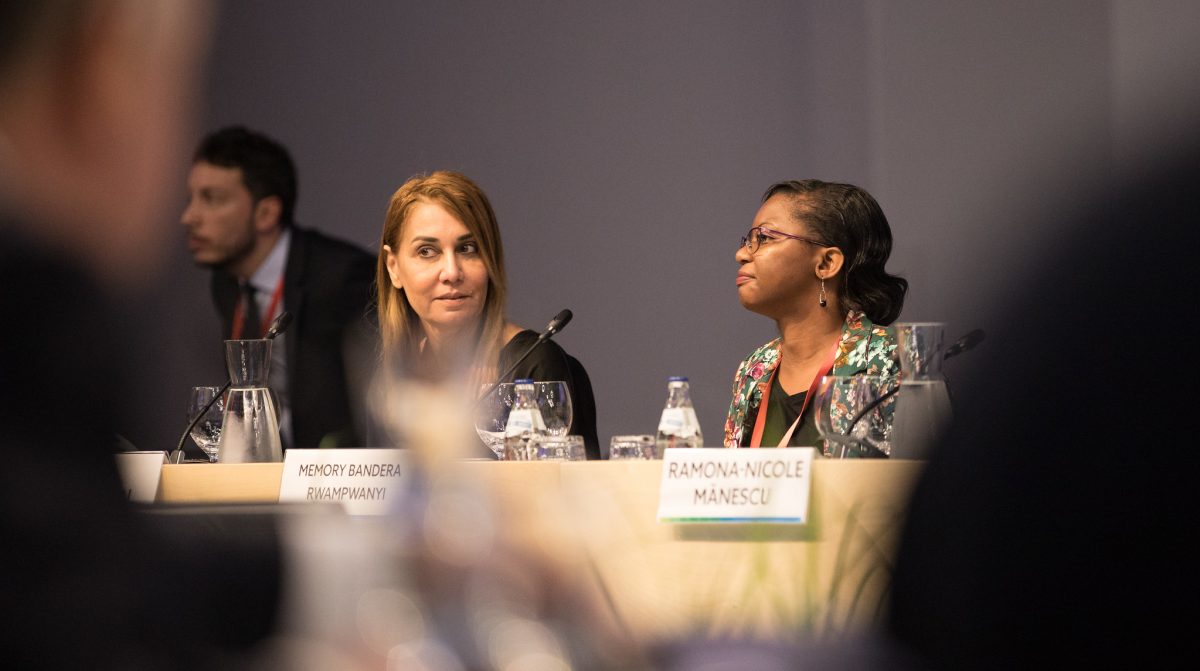
Nedal Al-Salman from Bahrain and Memory Bandera from Uganda attending a lunch meeting of EU’s foreign ministers. Photo: Lauri Heikkinen/Prime Minister’s Office
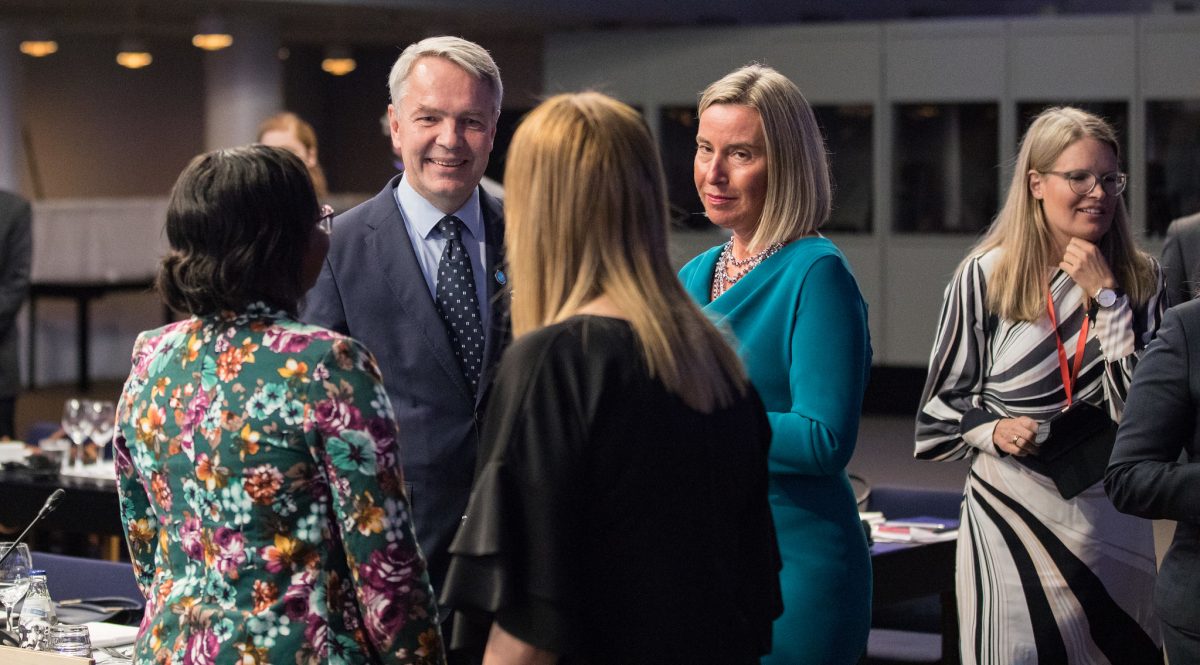
Foreign Minister of Finland Pekka Haavisto and the High Representative of the Union for Foreign Affairs and Security Policy Federica Mogherini greeting human rights defenders at Finlandia Hall. Photo: Lauri Heikkinen/Prime Minister’s Office
What the HRDs ask from the EU
KIOS invited Memory Bandera Rwampwany to talk at the seminar. Bandera is the Program Director in DefendDefenders, an organization that offers emergency support and security training for human rights defenders in East-Africa and Horn of Africa.
Attending the panel was also Salvadoran María Teresa Rivera, who was sent to jail for having a miscarriage. Rivera was accused of murder as a result of El Salvador’s strict abortion laws.
Other speakers in the seminar included journalist Jessikka Aro, Russian human rights lawyer Irina Birjukova, Ukrainian rainbow-activist Vitalina Koval and activist Nedal Al-Salman from Bahrain. Sirpa Pietikäinen, member of the EU parliament, represented EU’s view in the panel.
Foreign minister of Finland Pekka Haavisto opened the seminar. According to Haavisto, Finland is doing its best in keeping human rights on the agenda during Finland’s EU presidency. The foreign minister was interested in hearing from the HRDs how Finland and EU could do more in promoting human rights,
The activists gave many suggestions during the seminar day on how the EU could support especially women human rights defenders. They included:
- Diplomats must show their support for human rights defenders in social media
- EU can finance local and national meetings for HRDs.
- EU can organize seminars and other events for HRDs.
- EU can finance short stays for HRDs in Europe.
- EU must regulate social media companies.
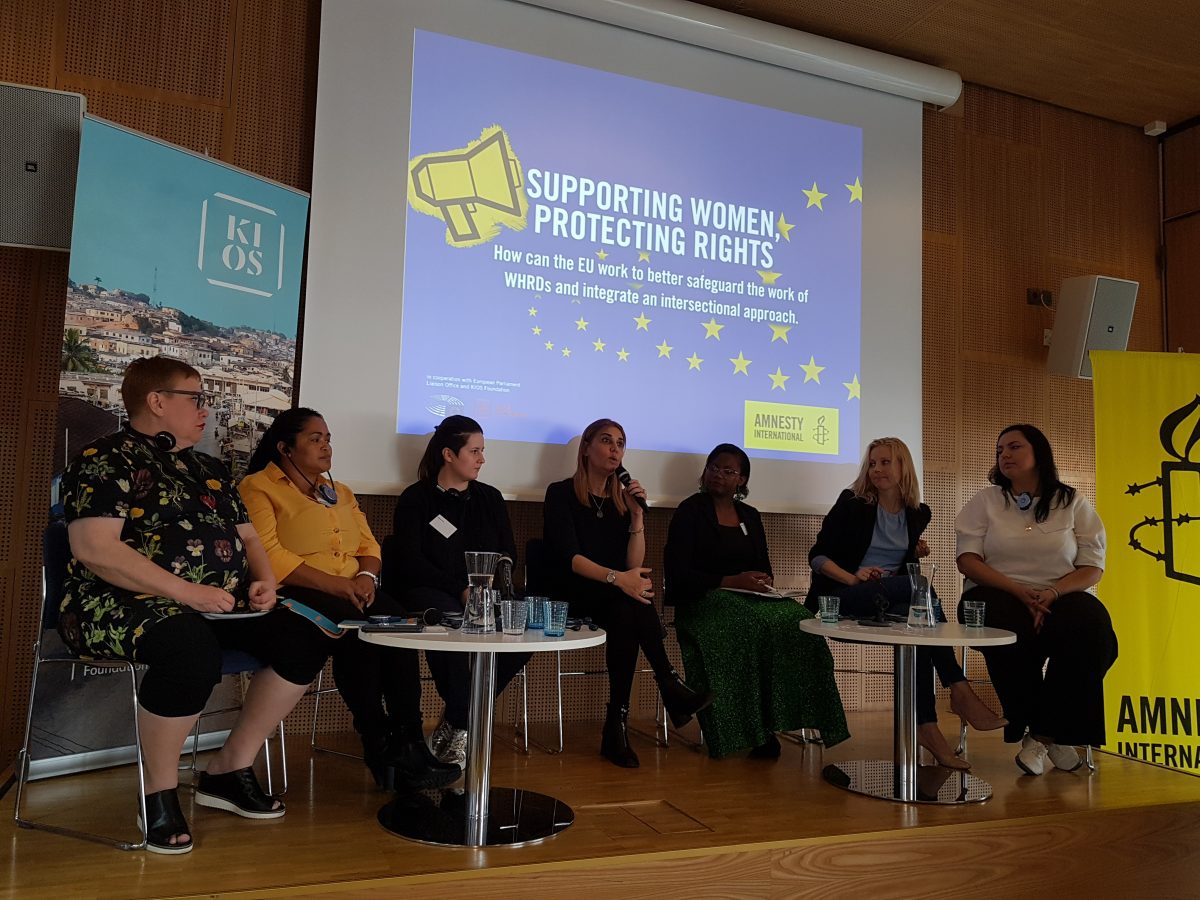
Women human rights defenders took the stage.
EU support for HRDs is not consistent
The first panel discussion of the day focused on how the EU and its member states protect and support HRDs. Participating in the discussion were ambassador Hannu Himanen, head of the Foreign Ministry’s human rights department Tarja Kangaskorte, head of the EU’s Foreign Affairs and Security Policy Committee Sofie From-Emmesberger and Russian human rights lawyer Irina Birjukova.
Birjukova, who was forced to leave the country temporarily for death threats, told that she received help from EU and from international organizations and now felt more safe than before.
”However, sometimes we need the EU to react faster, especially in emergency situations”, Birjukova said.
It was pointed out how the EU and its member states can help HRDs by following their trials and making public statements. Doing diplomatic work behind the scenes is sometimes the most effective strategy, reminded Sofie From-Emmesberger. Former ambassador of Finland to Russia Hannu Himanen said that the problem lies in the member states being non-unanimous, which results in non-consistent reactions by the EU to human rights violations.
The panelists asked for clearer public statements in human rights questions from the leaders of the state and from the EU. EU should take a stance and not leave these questions for each member state to consider. Political leaders must always bring human rights up in discussions with other states.
Irina Birjukova said that a big problem lies in social media and in hate speech and attacks that happen in it. She called for more presence in social media from the EU. Social media can also be a tool for protection: if something happens to a HRD, this can be brought to attention in social media channels, Birjukova reminded.
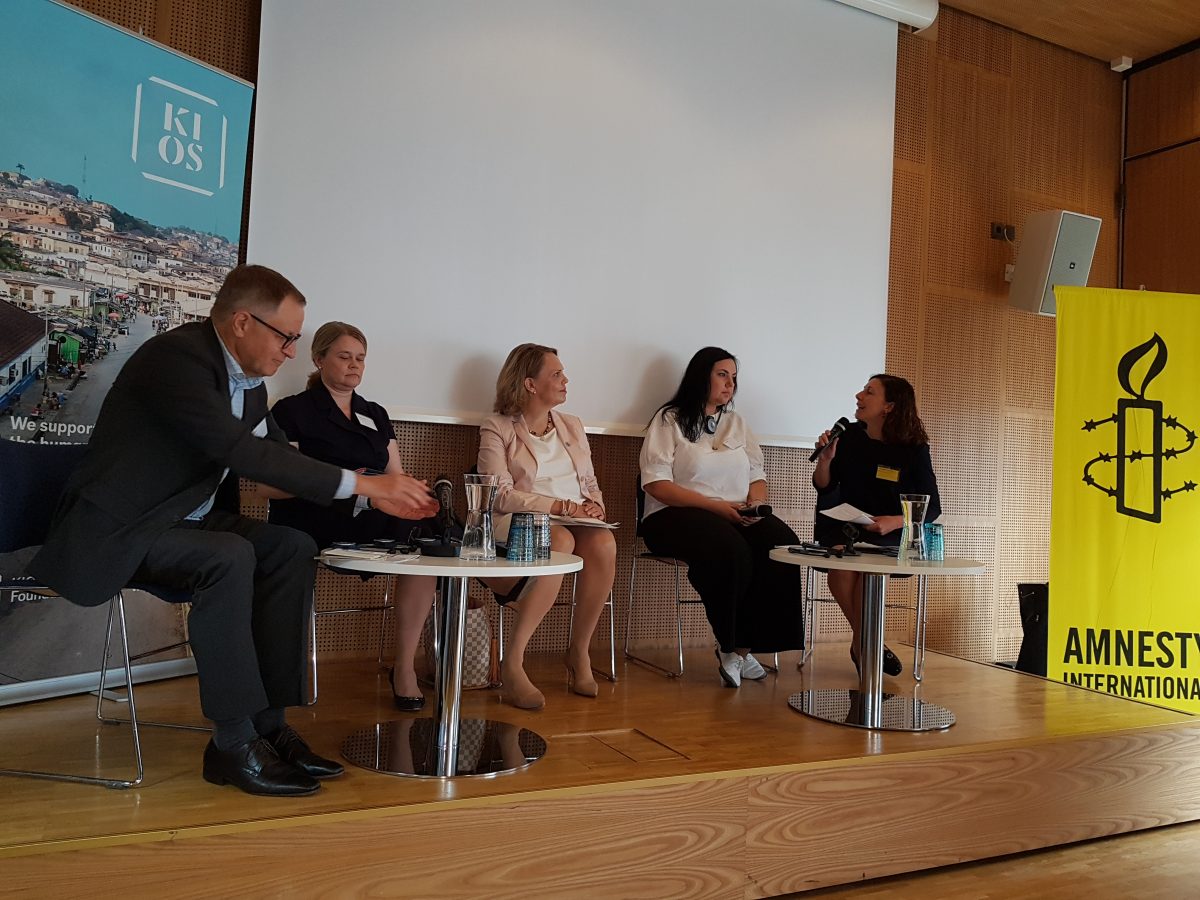
The panel discussion on EU support to HRDs.
The opposition to women human rights defenders
In the afternoon’s panel the women human rights defenders told moving stories about the obstacles they face. Defending human rights has resulted in them facing threats, harassment, defaming on social media, attacks by the extreme right, denials to leave the country and exile.
Women HRDs face sexual violence or its threat more often. Women who have been raped often keep silent for the shame attached to it.
”Sexual violence and its threat is used as a way to silence women HRDs”, said Bahraini Nedal Al-Salman.
Religion and family have a bigger influence on women HRDs than to men. Families may oppose to women who are activists and ask them to be silent. Salvadorian María Teresa Rivera reminded the audience that the families of HRDs also require protection.
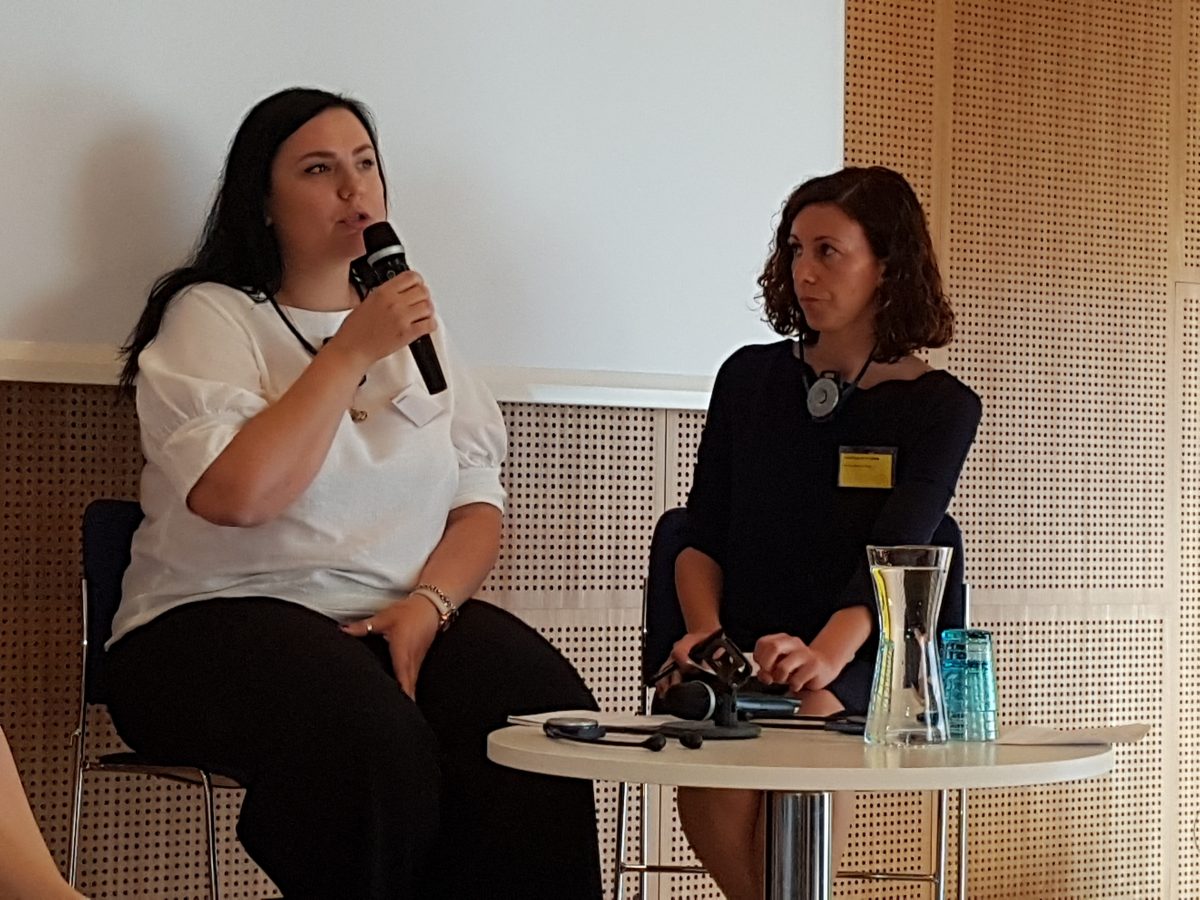
”By defending one, we defend all”, said Irina Birjukova, Russian human rights lawyer (on the left). Interviewing her is Covadonga de la Campa from Amnesty’s European office.
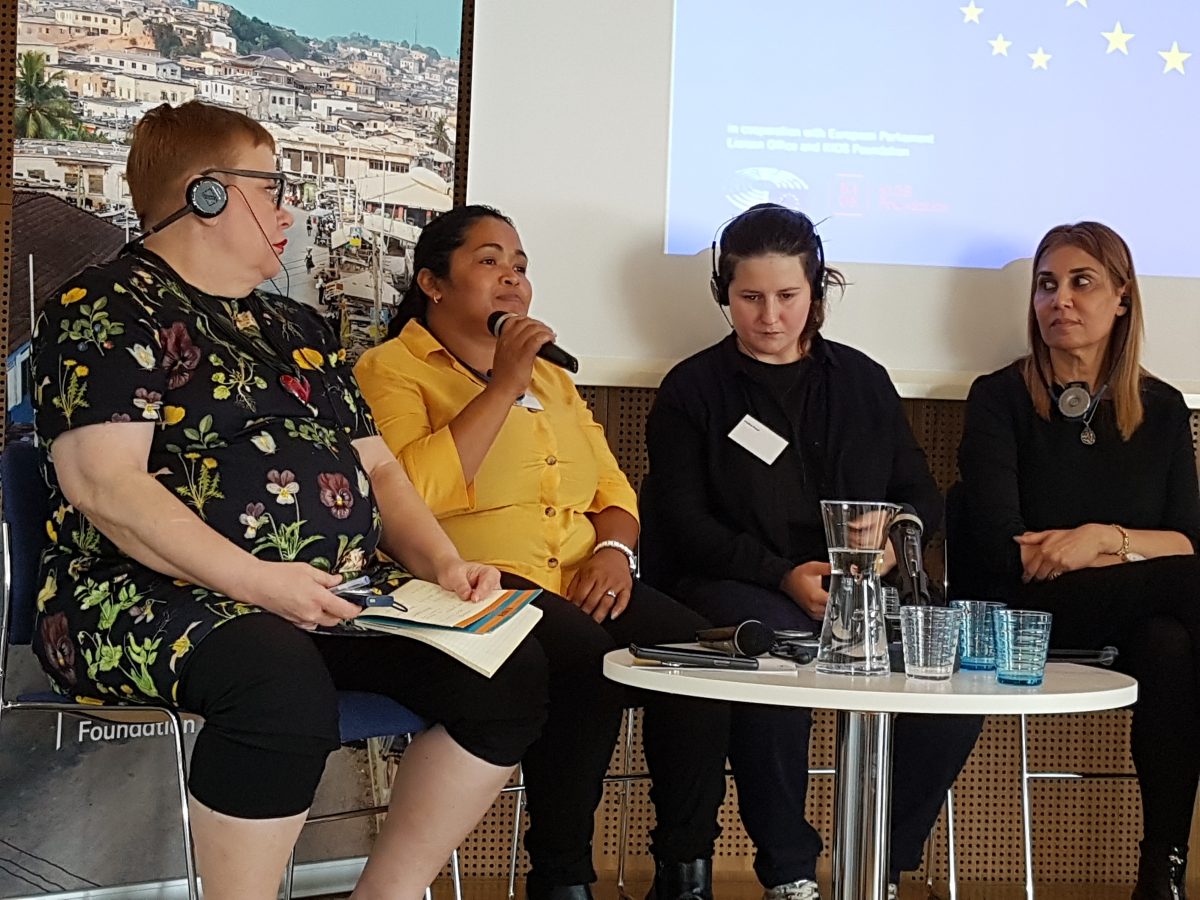
”Sexual- and reproductive rights are also human rights”, reminded Salvadorian María Teresa Rivera (second from left). Also in the picture Sirpa Pietikäinen (on the left), Vitalina Koval and Nedal Al-Salman.



